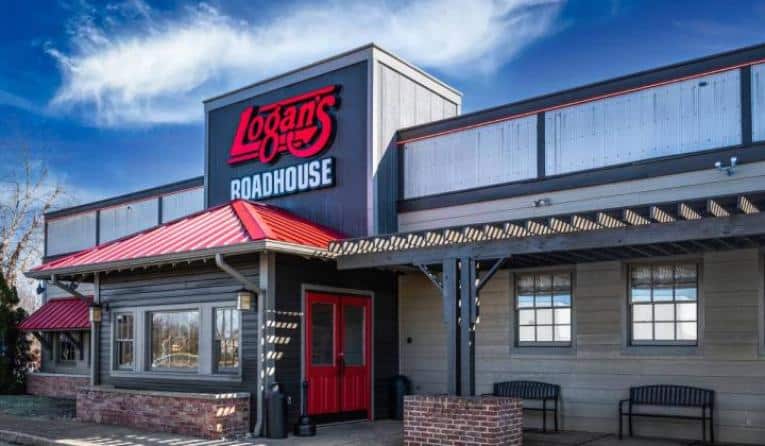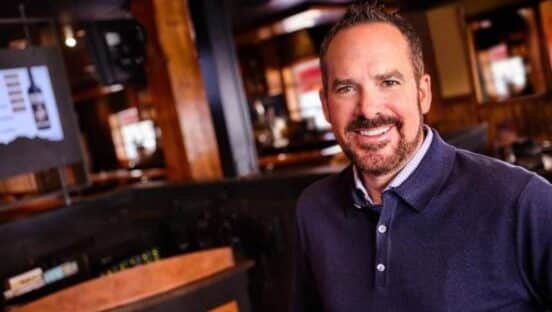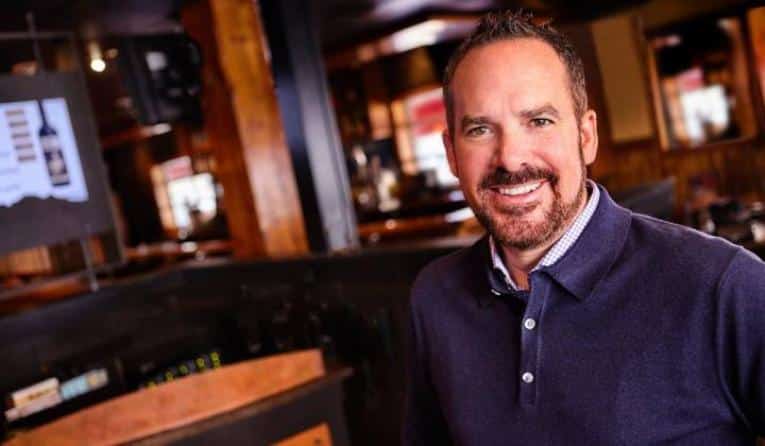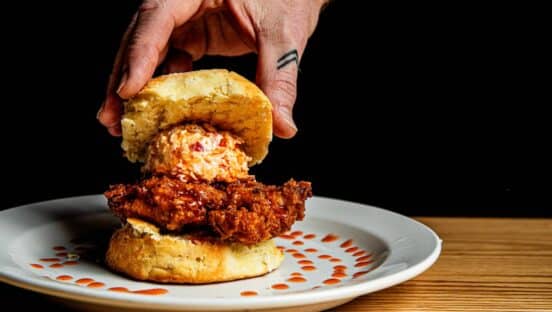It’s been an introspective 10 months for Josh Kern. He was named interim CEO of SPB Hospitality on August 22, elevating from president of concepts at the 16-unit group (he was previously its CMO as well). Naturally, Kern’s goal was to shed that tag and step into a permanent post over one of the country’s most diverse holding companies. SPB umbrellas 16 brands and hundreds of outlets across 35 states and the District of Columbia.
But that complicated makeup was responsible for the wait. To get out of “interim jail,” as Kern puts it, he had to prove his skillset was as nuanced as SPB itself.
SPB’s timeline dates back to May 2020. CraftWorks, the former and now-defunct parent company of Logan’s Roadhouse, Old Chicago, and several other brands, closed 37 stores and declared bankruptcy that March, when COVID titled the scales. It went from an organization employing 18,000 people to fewer than 25.
In May, Fortress Investment Group used a $93 million credit bid and bought 261 locations (77 franchised stores were omitted) and formed SPB Hospitality, which stands for “Steak, Pizza, Beer.” SPB acquired J. Alexander’s in September 2021 and officially evolved from a company considering “mothballing” stores, per court documents, to one with growth designs.
Yet that’s not to say SPB didn’t have work to do. Kern stepped in following the departure of former CEO Jim Mazany. He says it was a “tumultuous” time where SPB’s many moving pieces were in search of “some steadiness.”
Kern’s previous stops include four-plus years as CMO of Smashburger, the same role at American Blue Ribbon Holdings, and VP of marketing at Quiznos from February 2002 to March 2007—a span that saw the sandwich chain scale from 1,800 units to nearly 5,000. Kern also worked at Cerca Trova Restaurant Concepts and began his restaurant path advising White Castle with advertising agency J. Walter Thompson.
Through those years, he developed a reputation as a people-centric leader with an affinity for communication. The latter was something he felt SPB had to shore up. The time it spent on driving strategy, it strayed from what Kern felt needed to be the No. 1 focus. “It sounds very simplistic, but I think we lost sight a little bit just in terms of the people that we have, from dishwashers, back of the house to shift leads, chefs, bartenders, managers—that’s really where I believe this focus needs to be on,” Kern told FSR when he first assumed the interim gig.
Fortress recognized that strentgh in Kern. But, he says, the company’s stake in SPB—one of its largest restaurant investments—meant it had to make sure Kern possessed the acumen to take on the other aspects of the business. “I learned a lot about myself and just keeping my head down and grinding as much as I can,” he says.
In those coming 10 months, Kern oversaw SPB’s merger with Krystal, a deal that closed in April. Krystal was also bought out of bankruptcy by Fortress in 2020.
Kern was tasked with blending the companies while streamlining costs. Additionally, he launched the first major refranchising effort for the “original quick-service slider concept in the South.”

“Being able to provide [franchisees] with a brand that has a strategy, that has a proverbial North Star, makes it even more attractive,” Kern says.
“By fostering an environment that encourages collaboration and open communication, we can leverage the collective expertise and diverse perspectives within our organization to achieve extraordinary results,” Kern wrote in a recent open letter to employees and franchisees. “I am truly honored and excited to lead this incredible team and look forward to a future filled with limitless possibilities.”
Kern’s interim tag was removed in mid-June. Kern, a “tequila guy,” celebrated and took a moment to feel relieved. Then, it was on to what’s next.
As wide-ranging as SPB’s portfolio today is—it also includes Merus Grill, Redlands Grill, Stoney River Steakhouse and Grill, Rock Bottom Restaurant & Brewery, Gordon Biersch Brewery Restaurant, ChopHouse & Brewery, Big River Grille & Brewing Works, AIA Ale Works Restaurant & Taproom, Ragtime Tavern Seafood & Grill, and Seven Bridges Grille & Brewery—there is a gap: fast casual.
Could SPB fill it? “We are in a unique position—to have breweries, to have upscale, casual, have [quick service], we’ve got our ghost kitchens that are still functioning out there in the marketplace,” he says. “And so, it is very unique in the landscape … That is part of the thesis that if there’s opportunities out there to look at some concepts, whether it’s a new concept that can add that shared-services metric to, and we can grow it, that’s more in our crosshairs versus taking a brand that needs revitalization. I think we’re good at that. It just takes a lot of time and energy and especially capital when you’re talking about reimaging restaurants, that’s the hardest part of this puzzle.”
Essentially, the answer is yes. SPB, Kern says, will grab another acquisition if the opportunity fits. It’s also focused on developing the present footprint.
Krystal, Logan’s, Old Chicago, J. Alexander’s and Stoney River, are “all poised for some opportunity for growth,” Kern says. J. Alexander’s has two locations slated to open this summer—one in Annapolis, Maryland, and another in Naples, Florida. SPB recently opened a Logan’s in Fort Myers, Florida, and Old Chicago will likely open Q1 next year in Denver. A franchise is headed just outside Atlanta in August.
There’s been some paring down in recent years of SPB’s overall footprint, Kern says, but it was mostly tied to real estate that’s moved on in terms of the trade area. “For us, we’re really looking now at where we can deploy the growth mechanism and how can we reimage restaurants,” he says, “like a Logan’s that’s been around for quite some time. We know with our dialed-up food quality and our operations on track that if we have a shiny new asset, then that’s the winning formula for sure.”
Franchising and refranchising, in general, is a topic Kern spoke about at the start of this CEO journey. He still feels strongly about it, even beyond Krystal’s ambitions (the 300-unit brand believes it can reach 500 locations). The pendulum is swinging in that direction. “The level of sophistication of some of the groups out there is really encouraging,” Kern says. “And I think it’s always that old adage that when a franchise group or a franchisee invests in a brand, they’re fundamentally a little bit closer to the trade area and knowing the market. So being able to provide them with a brand that has a strategy, that has a proverbial North Star, makes it even more attractive.”
He adds SPB is closing in on naming a chief development officer who will help with site selection and securing some growth partners. The company also appointed interim CFO Jessica Hagler permanent financial chief. She was the former VP, CFO, treasurer, and secretary of J. Alexander’s. SPB recently named Casey Terrell, a former Focus exec who was serving as CMO of Krystal, SPB’s CMO as well.

With everyone, adjusting to SPB’s web of brands is a process that takes time. Kern says the guidepost is to create a center of excellence and shared leverage everybody can draw from, but to not homogenize any of the concepts. Krystal, for instance, is operating independently and has an office in Atlanta. Yet Krystal, like every brand in SPB’s arsenal, will take advantage of shared services, such as HR, accounting, finance, supply chain, and IT, to maximize efficiencies via collective scale. Terrell and the marketing team, however, will now have multiple gears they need to have at the ready. The consumer profile at a high-end steakhouse looks nothing like a fast-food burger icon.
Still, there’s undeniable whitespace in a multi-occasion restaurant group that can translate those profiles across different dayparts and segments. “We’ve done pretty good in the past and I know we can in the future with group sales,” Kern says. “Those are certainly back to the fabric of the country, soccer teams coming in, banquets, American Legion meetings. All those things are starting to happen more and I know we can embrace those through all the concepts.”
Kerns says the broader landscape for restaurants currently is, to put it lightly, “interesting.” Technology has the capability to stack these Lego pieces in ways operators never imagined previously. There’s AI and movement within social media—all systems to take messages and feedback and find ways to funnel it forward. Each time SPB acquires a brand, it gets introduced to new platforms, accounting systems, POS setups, and while it drains time and resources to sift through everything, each deal has taught SPB something new, Kern says.
“You learn from each of those acquisitions or mergers then you can get better,” Kern says. “I certainly think we’ve done a good job.”
SPB now oversees 18,500 employees and has three support centers—its corporate HQ in Houston, Texas; the Krystal Atlanta outpost, and a smaller office and test kitchen in Nashville. Kern says it’s not out of the realm of possibility for a future “center of excellence” to bring it all together, but he does believe the company previously misstepped trying to get everyone to move to Houston.
Opening up so workers can operate out of their home base but travel to collaborate, enabled Kern to recruit “some pretty damn interesting people,” he says.
“I am very bullish about the brands and the portfolio and we’re not without our challenges,” Kern adds of the bigger picture. “But I do remain optimistic, and I think I feel better about the economy across the country, supply chain certainly breaking in everyone’s favor. So now it’s just a matter of sticking to our guns and getting this strategy pulled through.”










